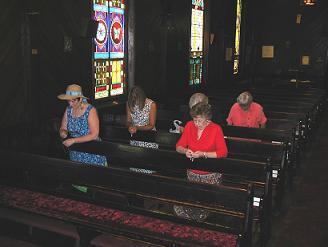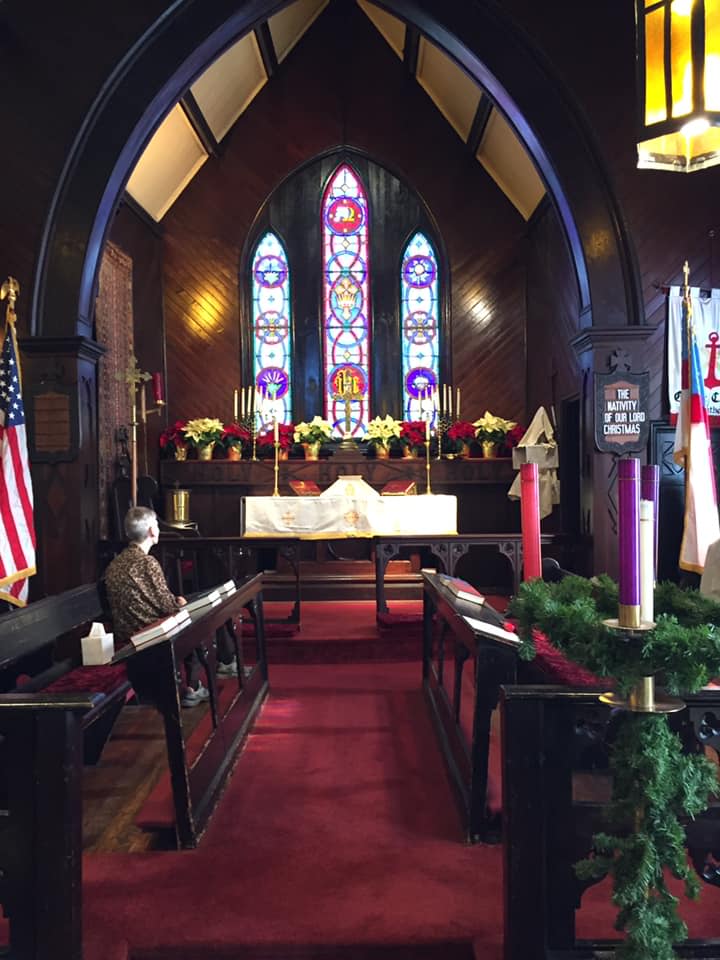What Do Episcopalians Believe?
People often ask,”Are you Roman Catholic? Are you Christians? What do you believe, anyway?”
We believe in our Statement of Faith, the Nicene Creed and our Baptismal Covanant, the Apostle’s Creed. We don’t really add to and never subtract from those Creeds.

We Believe…
In the Trinity: Father, Son and Holy Spirit, Three in One
- That Jesus is Christ, the Messiah, and that he died for our sins
- That He was born of the Virgin Mary after being conceived by the Holy Spirit
- That He walked the world as a mortal for 33 years
In Christian Hope:
- Christ will return to earth someday
- The dead are born to new eternal life
- Those who follow the path of Jesus will see the Kingdom of heaven
- That Christ rose from the dead and walked among His followers before being lifted up into Heaven.
- That God spoke with and through the prophets
- That God has one universal (catholic) church
- That our priests are in the direct line of consecration handed down from Jesus to the apostles and are part of the same divine institution built upon that foundation (Ephesians 2:20; John 20: 19-22)
- That the Saints (living and righteous dead) are with us in community (they hold a special place in our hearts)
Our Baptismal Covanant gives us steps or processes to become disciples of Christ Jesus:
- Belief in the creation of the world by the One, True, Triune God
- Fellowship through prayers and the breaking of bread
- Use of our time, talents and treasures to produce the work of God
- Proclamation of the Good News to all persons
- Repentance and return, perseverance in the battle against evil
- Service to Christ through serving all people
- Work toward justice and peace

So Are You Roman Catholic?
We are often confused with the Roman Catholic Church because our worship services are similar and because the priests and deacons of both faith traditions wear special clothing, called vestments. We are both Christian religious traditions and we respect those of Roman Catholic faith. However, there are many differences between our beliefs. It is these differences that make us the Protestant Episcopal Church.
Catholic means “proclaims the whole faith to all people, to the end of time” (Book of Common Prayer, page 854). This faith is applicable to all people in all places at all times (See Matthew 28:19). No denomination or “church” can claim it holds exclusive rights to the descriptive “catholic”. We must recognize that any specific branch of Christianity is only a part of “the one holy, catholic church”.
The Communion of Saints is the entire family of God, living and dead, who are part of the body of Christ. We are bound through belief, sacrament, prayer and praise (Book of Common Prayer, page 862). The term “Saints” indicates that these are people who are holy or set apart. It means that all Christians are different from others (Romans 1:7; 1 Corinthians 1:2) in that they have received the gift of the Holy Spirit. It means that, no matter how imperfect we are, we strive to become more like our Lord (Philippians 3:12-14). Through the Holy Spirit, all Christians are bound to and through Christ Jesus in a great community of the living and the dead. (Ephesians 2:19, 4: 15-16; 2 Corinthians 13:14).
The Basis of Our Beliefs and Practices
The Episcopal Church is the American province of the Anglican Communion, a worldwide body of over 70 million Christians who trace their origins to the Church of England. Often, the Episcopal Church is called a bridge church between Roman Catholicism and Protestant denominations. This is because much Episcopal theology is Protestant in nature, while much of Episcopal worship, spiritual practice, and church structure resemble the Roman Catholic tradition. As a result, individuals and families from a variety of backgrounds will find in the Episcopal Church a home that honors their own faith tradition while providing a new source of shared experience.
The Book of Common Prayer (BCP) is the official book of worship and is an important part of Episcopal life. The Prayer Book includes a wealth of prayers and liturgies for virtually every occasion. It serves as a way to center our life in Christ.
The word Episcopal is derived from the Greek word for bishop. Thus, our very name means that the Episcopal Church is structured around bishops. Episcopal bishops, like bishops in the Roman Catholic and Orthodox churches, trace their authority to the first-century Apostles. Each bishop oversees a geographic area called a diocese. Within a diocese are local congregations called parishes. A parish consists of a body of baptized Christians, often served by an ordained priest and deacon.
Episcopalians describe the foundation of our faith by using the image of a 3-legged stool.
The first leg is Holy Scripture, which Episcopalians say is the Word of God, written by human authors, and inspired by the Holy Spirit (from the Catechism in the Book of Common Prayer). The Old Testament tells us of the dealings of God with the people of Israel, before the time of Christ. The New Testament tells us of the life, death and resurrection of Jesus and the faith journey of the first generation of disciples. The wisdom provided by the Scriptures guides our lives of faith.
The second leg is Tradition. When we talk about tradition, we are referring to those past generations and their interpretation of God’s purposes. Especially valued are the interpretations offered by the early Church Fathers and the Church Councils. The first council of Nicaea wrote the Nicene Creed which Episcopalians recite every Sunday. This creed reminds us of the nature of God as Father, Son and Holy Spirit.
The third leg is Reason. Episcopalian’s believe that God created human beings in his image and has given us reasoning minds, by which we may understand his revelation. We honor God and this gift when we use our minds to thing deeply about God’s will, consulting Scripture, Tradition and the many ways that God is revealed in the world around us.
Growing Our Church for God’s Work
Together we can make a difference in our community. Please feel free to donate to Grace Episcopal Church to help us grow our ministry and outreach.
